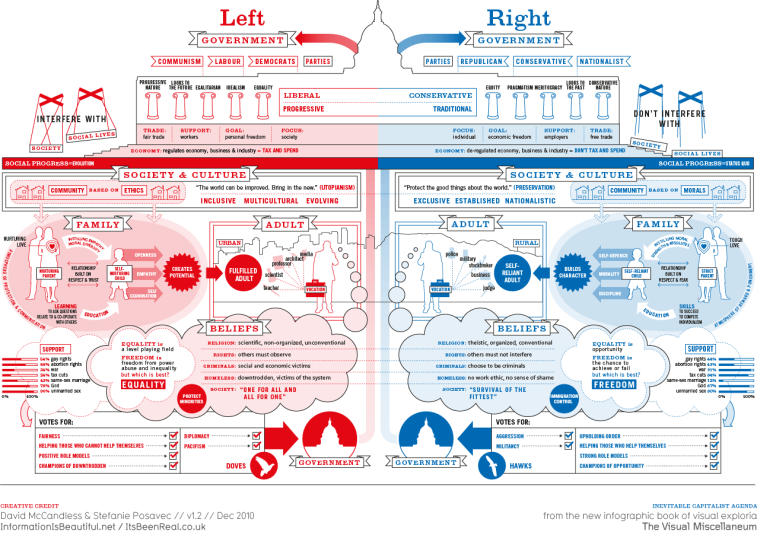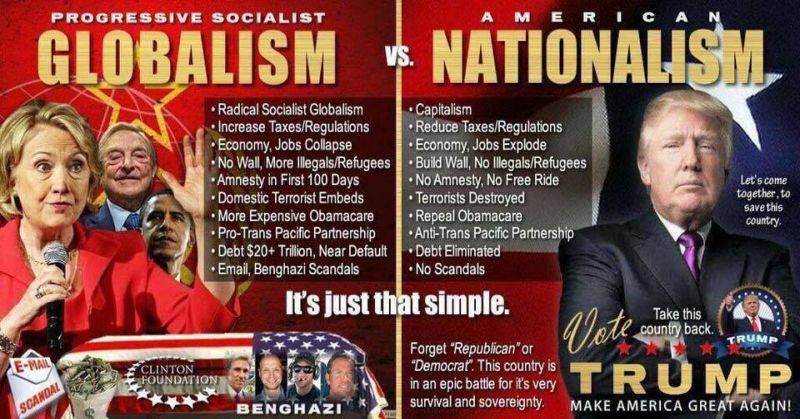Globalization and rising prosperity have changed the values and behavior of the urban elite, leading them to talk and act in ways that unwittingly activate authoritarian tendencies in a subset of the nationalists. Each country has followed its own unique trajectory of development. However, if we were to generalize, countries seem to move in two directions, along two axes: first, as they industrialize, they move away from “traditional values” in which religion, ritual, and deference to authorities are important, and toward globalized and regional co operations. Second, as they prosper, nations move away from “survival values” emphasizing the economic and physical security found in one’s family, tribe, and other parochial groups, toward “self-expression” that emphasizes nationalism and a backward shift to traditional roots and values.

Thought processes dividing into globalism and nationalism bring about the approaches on the two axes. Nationalists or the right wing populists see patriotism as a virtue, they think their country and its culture are unique and worth preserving with a feeling of a bond with their country, and they believe that this bond imposes moral obligations both ways: Citizens have a duty to serve their country, and governments are duty bound to protect their own people. Globalization breaks down the need for having a shared sense of identity, norms, and history. Having no such shared sense leads to the condition that the sociologist Émile Durkheim described as “anomie” or normlessness.
American nationalism (not widely spoken about) in all its red, white, and blue glory, is shaped in part by race, class, and religion—from the belief that the United States is a Christian Nation, divinely inspired and tasked, to bourgeois patriotism that invokes widely accepted mythology in order to show disdain for the poor. Trump, who is rebuffed by liberal commentators for his bigotry, is a product of this nationalist sentiment. His patriotism, even as expressed in oftentimes violent, misogynist and discriminatory language, shares the same obsessive devotion to the state as that of many other lawmakers and laypersons who may not share his politics. It was appalling see the Internet reacting in exaggeration when Trump won. But I never once, fore sought the ‘liberal’ Clinton’s victory because those are ideals that every nationalist nation is moving away from. USA was threatened with the rhetoric of ‘not being great anymore’. The notion that the United States is a shining beacon on a hill is the kindling of right-wing populism, as well as mainstream nationalism. It is what has made wars more palatable, it is what justifies surveillance measures, black sites, and what has made the castigation of dissenting voices not only permissible but also necessary in order to preserve the lore, that America is a remarkable nation, and for that Americans must be grateful. To voice the resentment of not wanting to interact with a black is also a ‘choice’, an argument given my all liberals in status quo, which no more needs to be curbed, thanks to Trump.

Developed nations like France have also anticipated the rise of the La Penn led National Front which is the far right political regime of the nation due to the threat that nationalists see with the advent of globalization in the nation-state. For France, nationalism was never just a tendency but the French nationalism is a deeply engrained phenomenon since Napoleon Bonaparte’s ideology after the French revolution of 1789. After the Second World War, war hero Charles De Gaulle’s government sought to make France the leader of an independent Europe – free from American and Soviet influence and sought Franco-German reconciliation. They took a leading role in the founding of the European Coal and Steel Community that sought to resolve economic tensions between France and Germany to safeguard national interest. Today, this feeling of centuries of nationalism remains revived with the globalist backlash that the French face leading to a fore sought sweeping victory for the conservative and right-wing National Front.
In several European countries, including Finland, Hungary, Latvia, Lithuania, Norway, and Switzerland, right-wing parties have taken the reins of government. And even where right-wing populists haven’t gained power, groups such as Britain’s UKIP, the French Front National, and Netherland’s right Freedom Party of Austria received a stunning 49 percent of the vote in his country’s presidential election. Although Hofer was ultimately defeated, his strong showing opened a new chapter in the story of Europe’s populists.
Coming closer to home in developing nations like India, where the agenda of the Modi Government was nationalism, which is often tweaked in a shade of saffron by those ‘liberals’ who do not understand where right-wing nationalism stems from. Extremism and anti-secular are words thrown in accusation without understanding that the 3/4th-sweeping majority’s election agenda was purely nationalist and ‘making India great again’. Another great example to give is Japan’s recently elected liberal democratic party in 2014 which works on the principles of reviving nationalism and is of a conservative ideology. The future is likely to stand testimony to the rise of the right-wing across the globe with the rise of populism and nation-states following a trajectory of nationalism, which preserves their interest, the most.
The minute we impose norms on a nation that has its roots in a different culture and mindset, it is bound to become unstable. The world may be moving towards flowery ideas of liberal narratives of nudity, LGBTQ rights, Gay Marriage etc, however, in all nations across the globe, despite the advent of multiculturalism, will not stand for a narrative that does not abide by their cultural and moral roots. There is no benefit in political correctness when the voice of dissent comes from a place that does not fit into the nationalist agenda of preserving one’s own culture but making it a free state for all. Politics and agendas around the glob are radically changing with people seeing more merit in a nationalist agenda rather than a globalist stance which safeguards national interest over international transactions. To preserve the identity, culture and nationhood of a state is overpowering the ‘liberal’ ideas of bi lateral and multi lateral engagements. It is an era of the rise of the right and will continue to be so until there is again need for a globalization outlook down the timeline, which in itself is a cycle of inevitable change.


How does India’s right-wing nationalism fits into this? Is it India first and move away from regional cooperation? Or, regional solidarity only when it preserves and suits own nationalism? Wouldn’t this concept of nationalism extend into local regions within the country eventually?
LikeLiked by 1 person
BREXIT was nation over globalization. Trump is against NAFTA and TPP, America first. These are all right-wing modifications of nation first against what was globalization. India’s posturing regarding SAARC for sake of national security is similar — I agree with it, though.
Marathi-Manus of Shiv-Sena is similar posturing of ‘regional nationalism’ and is dangerous. These are all examples of the new right-wing anti-globalization.
LikeLike
Yes exactly. Its all moving towards nationalism and that is exactly what the article is trying to convey.
Regional nationalism is basically from the extreme right due to the absence of a uniform census on what nationalism is. India is currently lacking the meaning of nationalism and that is yet to come into mainstream ideas of NDA. Revival of Hindi , culture etc are in place and need to be worked upon for easy functioning of the state. I agree.
LikeLike
The nationalist tendency in india still is coming under one banner which is being misconstrued as ‘saffronization’. Hopefully, the uniform civil code will come into play and safeguard india from liberal global agendas which do not coincide with the culture of the land. This nationalism is the concept that needs to extend locally within the nation.
Regionalism does not really affect this at all as bordering nations seek interdependence on each other for primarily economic terms.
Hence, a feeling of nationalism can be instilled along with the advent of bilateral and multilateral agreements. All i am saying is, its time to shift from being dependent or influenced by globalisation to come back home via nationalism.
LikeLike
BREXIT was counter to globalization. Trump is opposed to NAFTA and TPP. These are opposed to globalization. On regional level, Marathi-Manus is ‘localized nationalism!’
Globalization is good but the new nationalism is opposed to that. India getting away from SAARC due to national security concern is another example — I do agree with this, though.
LikeLike
Brexit, NAFTA and TPP are all regional cooperations that are still existent despite the resilience shown from all governments in the past. Britain exited the EU because it wanted to serve its own national interest by not having to economically support all if Europe.
India is not getting away from SAARC. In fact, had the maximum contributions to make. However, the failures of SAARC due to the terrorism and heterogeneous cultures of South Asian Nations were the main factor for all SAARc nations to realise that its not a viable option.
Globalisation started off as a great idea for progress and exploration but the developed nations started exploiting the developing ones. Wallerstein’s World System Theory is guarantee of that fact.
In todays’s day and age, nations have to preserve themselves in overarching garb of dark exploitation.
Which even India needs to bring about in ways like the revival of hindi language, revival of culture and spirituality which will act as deterrence to xenophobic and heterogeneous ideas.
LikeLike